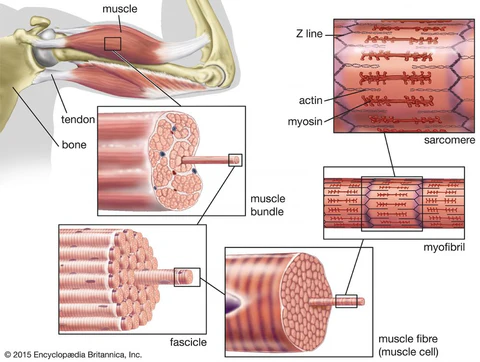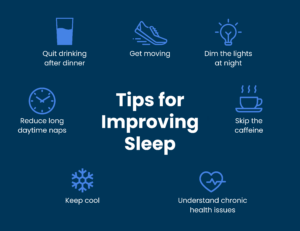Sleep is one of the necessities as far as one’s health is concerned, However, sleep is also associated with the recovery of muscles. Whether you are an athlete, a fitness fanatic, or just someone who wishes to know how to recover better after engaging in strenuous activity, one thing is worth noting is the research regarding the relationship between recovery and sleep. Sleep is the most effective recovery tool that exists. While we sleep, various processes are executed inside our muscles- some heal minor damage, some strengthen the muscle, and some restore energy in the muscle. Let’s try to demystify the bond between sleep and muscle recovery by analyzing the science behind it.
Understanding the Sleep Cycle and the Role It Plays in Recovery
The sleep can be broadly categorized into two types- NREM sleep and REM sleep, Non-Rapid Eye Movement. Rapid Eye Movement Sleep is accompanied with dreaming sleep, that we typically do during the night. NREM sleep has three stages, in which stage 3 is considered to be the most significance in terms of recovery and is referred to as Slow Wave Sleep. The role this stage plays is that the body during this period is in rest and recovery phase mainly for the muscles exposed to physical activities.
Stage 1 (Light Sleep): At this stage, your body prepares itself to sleep from being awake. While muscles indeed shift into recovery mode, it isn’t as deep as required for muscle repair.
Stage 2 (Light Sleep): The body continues to relax, as the heart rate and body temperature drops and muscle activity decreases too. As a precursor for further deeper recovery mechanisms, muscle repair processes primarily occur during sleep stages that are much deeper.
Stage 3(Deep sleep or Slow-wave sleep) – In this stage, everything that was in the realm of dreams in the last stage can now magically come true as you make it a reality. This is all facilitated by a hormone known as the growth hormone which plays a key role in muscular development, formation, recovery, and enhancement alongside blood flow and circulation. Muscles are fuller in this stage as the body works intensively to heal micro-tears that were developed through exercise or activity.
REM Sleep: Aids in the retention of memories crucial for both cognation and brain function, depression, and other emotional issues however it does not play a significant role for muscles to recuperate. Nonetheless, the recuperative functions of REM sleep do enable the body to rest properly in preparation for subsequent participation the next day.
Growth Hormone Release During Sleep
One of the key processes that happens while a person sleeps is the secretion of growth hormone, an essential substance for ‘muscle recovery’. It can be noted that the secretion of growth hormone mostly occurs in deep sleep, particularly in the Slow-wave sleep stage. This hormone helps to enhance tissue growth, protein metabolic processes and muscle fibers repair.
During physical exercises like resistance training or endurance exercises, muscles get somewhat torn as a stress reaction during the activity. These small ruptures have to be healed for the muscles to grow and become more powerful. More often than not, growth hormone does provide some help in the repair of muscle fibers.
Considering that sleep is crucial for growth hormone release, insufficient sleep may hinder muscle recovery and consequently impede progress. This implies that a sleeper is always at risk of injury at night if they don’t go through an appropriate stage where rebuilding the muscle fibers occurs.
Protein Synthesis and Muscle Repair
This explains why muscle-mechanisms are key in protein metabolism given that protein synthesis is the means by which the body replaces and repairs rearranged muscle. Exercises in muscle stress build-up as the muscles, consist of fibers, where proteins form parts of. In the fleshy period of the day where deep sleep dominates, there is an increase in the level of protein synthesis in the body in order to repair those tissues. This is a critical process in muscular recovery.
Also worth consideration is the tendency of muscle protein synthesis to be impaired because of lack of sleep, which has been in one way or the other known to delay recovery of muscles grown in mass and strength. Maintenance of enough efficient sleeping is also critical in allowing the body to carry out major activities as such enhancing recovery and performance in the next workout session.
The Role of Sleep in Reducing Inflammation
The inflamed areas have also been reported to be sore, stiff and even painful as a result of the damage. Though a degree of this is welcomed in muscle hypertrophy, uncontrolled and long inflammation might take longer for healing and increase chances of further damage. Sleep in this respect is imperative for controlling inflammation through homeostasis and induction of anti-inflammatory cytokines.
In the presence of sleep, the immune system is activated to help eliminate the waste caused by muscle injury and inflammation. This reduction of inflammation enables the muscles to heal quickly and more efficiently. On the contrary, lack of sleep can increase inflammation that temporarily reduces muscle repair and recovery in one way or the other.
Physical Performance Related Sleep and Energy Restoration
According to general opinions, muscle recovery includes the restoration of energy levels, in addition to tissue repair. Muscles use energy in the form of glycogen during physical activities. Once the activity is over, it becomes imperative to restore muscle energy as well as prepare the muscle for a future event by topping up glycogen reserves. It’s interesting to note that there’s an important element of sleep in this successive process which makes all of it possible.
Glycogen replenishment seems to be enhanced by sleep through the modulation of a number of hormonal processes, facilitating recovery after an acute bout of exercise. This process and its resulting inhalation are particularly critical to athletes or anyone exercising frequently and at high intensity. In the absence of sufficient sleep, it would be impossible for the body to almost replenish the stores of glycogen, which will ultimately result in a decrease in workout performance and potential growth stimulation.
The Consequences of Lack of Sleep on Muscle Recovery
Chronic sleeping disorder and poor quality of sleep are factors that extremely interfere with muscle recovery which significantly helps in one’s performance as an athlete. Sleep deprivation contributes to decreased growth hormone secretion, decreased protein synthesis, heightened inflammatory response, and prolonged glycogen resynthesis. Also, it may contribute to decreased sleep which leads to irritability, low drive, depression and slow thinking all of which affect one’s body performance.
It has been noted in the studies that sleep deprived athletes are more exposed to injuries and take longer time to recover fully after an intense workout or competition. Lack of sufficient sleep has psychological and cognitive effects such as decreased clarity and mood which in return affects the decision making processes and focus that results during training.
Getting Enough Sleep for the Better Recovery of Muscle
In the first place it is important to emphasize sleep and enhance its overall quality of recovery as it is significant in enhancing muscle recovery. Set a target of getting at least 7-9 hours of good quality sleep on daily basis as this will vary greatly depending on the age, level of activity and other requirements. One of the best places to start is to improve factors that affect sleep such as environment, sleep routine and consumption of pleasure inducing substances including caffeine and electronics.
Also, perhaps use techniques that would allow you to relax such as meditation, stretching, or deep breathing exercises to relieve stress and enable you to get deep and restorative sleep. If you are taking part in contact intensive drills or exercise, allowing enough periods of sleep in between them is vital for the recuperation of the muscle and to prevent overstretching.
Conclusion
The connection among sleep and recovery of muscles is something that has been proven scientifically and it is vital for anyone who is trying to improve his physical performance or accelerate the body to heal after exercises. The muscles are built and repaired during sleep as growth hormone is secreted along with other substances that lessen swelling and restore energy supplies which are all vital for muscle recuperation. Sleep dominance, on the contrary, will in turn affect what has been mentioned above resulting in prolonged recuperation of the muscles and a poor general mark of achievement. By making sleep a priority and regular under sleep, a person is able to enhance their muscles recovery rate, strength capacity and their general wellbeing.




